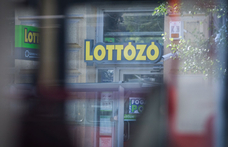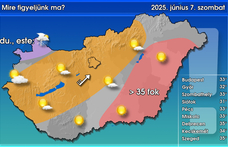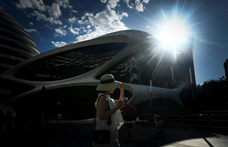The leaders of the Christian Democratic People's Party (KDNP) say they are still owned more than HUF100m of public money. The Christian Democrats' Istvan Barankovics Foundation, which was set up this June, is fighting to get a government grant like the other four parliamentary parties. They lost the first round in June when the government distributed money to the parties according to the new parliamentary balance of power. As it happens, the division of spoils was most favourable to the Christian Democrats, because the party got into parliament on the back of a joint Fidesz-KDNP list, and thus received HUF13.7m. The party's foundation did not receive any money, however.
The debate centres on differing interpretations of the law. The law states that the full sum is owed if the party running the foundation has fielded a parliamentary group "following at least two successive parliamentary elections." This is why it was important for the KDNP to establish an independent parliamentary group despite the common electoral list. They claim to meet the criteria, because the law does not specify that the two successive elections have to be the most recent. The KDNP formed a parliamentary group in 1990 and 1994. A complicating factor is that the KDNP foundation had not been established when this parliament first sat on 16 May. HVG understands that the party and the finance ministry are now waiting for the Justice Ministry's conclusion.
The Barankovics Foundation is legally a new institution, but in reality it is a 'resuscitated' version of an existing organisation.
The KDNP established a foundation under the same name in 1990, but it started winding down at the end of the 1990s, at the same time as the conflicts that raged between different factions in the party. In 2002, Christian Democrats faithful to Fidesz successfully sued for control of the party. The leadership shut down the Barankovics Foundation, which by that time only existed on paper. Zsolt Semjen, the party leader, then re-established it under the same name.
One of the functions of the party foundations has always been to build up a solid party base, but they have also had a fundraising role.
Fidesz's organisation, the Alliance for the Nation Foundation, which was set up in 2002, has been particularly successful in this, as has the Foundation for a National Consultation, which was set up in 2005.
Together, they raised HUF365m in donations last year. The two organisations have raised more than half a billion forints in recent years.This has allowed them to establish institutions like the Civic House, which has served as Fidesz's party headquarters since the party's electoral defeat. But they have also played a role in shoring up Viktor Orban's personal constituency at the expense of a broader Fidesz supporter base.
This is shown by the fact that Orban was given an office in the building in the 8th district before the party leadership moved there, and also by the fact that Imre Makovecz, who established the Alliance for the Nation, has written in his will that the rights of founder will be transferred to Viktor Orban if he dies. The other foundation owes its very existence to the Fidesz president's magic words. In his State of the Country address last February, he said: "Let 2005 be the year of national consultation. We have to set this process in motion, dear friends!" Shortly thereafter, his political followers established the National Consultative Body, which was led by Julia Kudlik, a former television presenter.
The foundation, which was set up in 2005, is led by the engineer-economist Janos Pakucs and has primarily been an electoral campaigning organisation. Its main activity thus far has been to distribute the committee's questionnaire to 3.6m households. The committee then travelled the country in a "national consultation bus", visiting almost 800 districts and holding meetings in six large cities. The organisation's major expenses are advertising (HUF92m) and printing costs (HUF54m). Friends have helped the organisation save money. The foundation's office on Madach ter was provided by Andras Ungar, a property developer who has since died. The VW Polo that was the first prize in the prize draw attached to the questionnaire was the gift of the company Csermely and Partners.
Little has been heard of the National Consultation recently. Things are different with Csaba Hende's Alliance for the Nation, which runs the Civic House. It is run by Gabor Kubatov, who played a key role in Fidesz's electoral campaign. The foundation bought the four-storey building for HUF107m from Investors Bau Property Investors and Contractors Kft. At the end of 2004, the bill for the building, including renovation, had reached HUF369m, and it was no longer possible to cover it through donations. The foundation was obliged to take out a five-year loan of HUF100. The building is thus owned as security by the Hungarian Foreign Trade Bank, which also provides credit to Fidesz. In future, the foundation will earn money from the 1600-square-metre building. In the first year, the foundation earned almost HUF37m by letting two floors of the building.
Until now , the most successful fund-raising foundation has been the Foundation for the Free Democrats, which raised HUF250m in 1994 and
1995 to support the party. Most of these fund-raising foundations were dying out at the end of the 1990s, even if they continued to exist on paper. This seems to have happened with the Free Democrat's foundation as well, since the Free Democrats today claim to have only one party foundation, the Mikos Szabo Foundation, which was set up in 2003, even though the other organisation, which was established 13 years ago, continues to exist according to court documents.
In the late 80s and early 90s, almost every party tried to raise money through foundations. The first organisations were the Forum Foundation, the Smallholders' Electoral Foundation and the Social Democracy '89 Foundation. They were all established by private individuals in the hope of building up a solid financial backbone for resurrected historical parties.
But Hungarian voters seem reluctant to spend much on their parties, which live primarily on state hand-outs. Membership fees and donations are just a supplemental source of income. It was in recognition of this that a law on party foundations was passed in 2003, which made it possible for parties to earn supplemental money via their foundations.
The state has directly distributed HUF2.549bn to the parties this year, and the foundations have provided a further HUF1.093bn.
Fidesz's defeat in the 2002 elections and the establishemnt of the Civic Circles movement led to a wave of donations on the Right. Ferenc Gyurcsany seems to have been impressed, since he moved at the begining of 2005 to establish the Foundation for a Modern Left-Wing. This foundation, which also runs the PM's blog, relies not on donations but on business activities. The foundation is at the centre of the business network which partially fiannces Amoeba, the Socialist Party's youth wing. Makovecz's foundation also has business activities, since it has to pay off its debts or risk losing the Civic House, which the bank will own until at least 2009.
GÁBOR JUHÁSZ

















